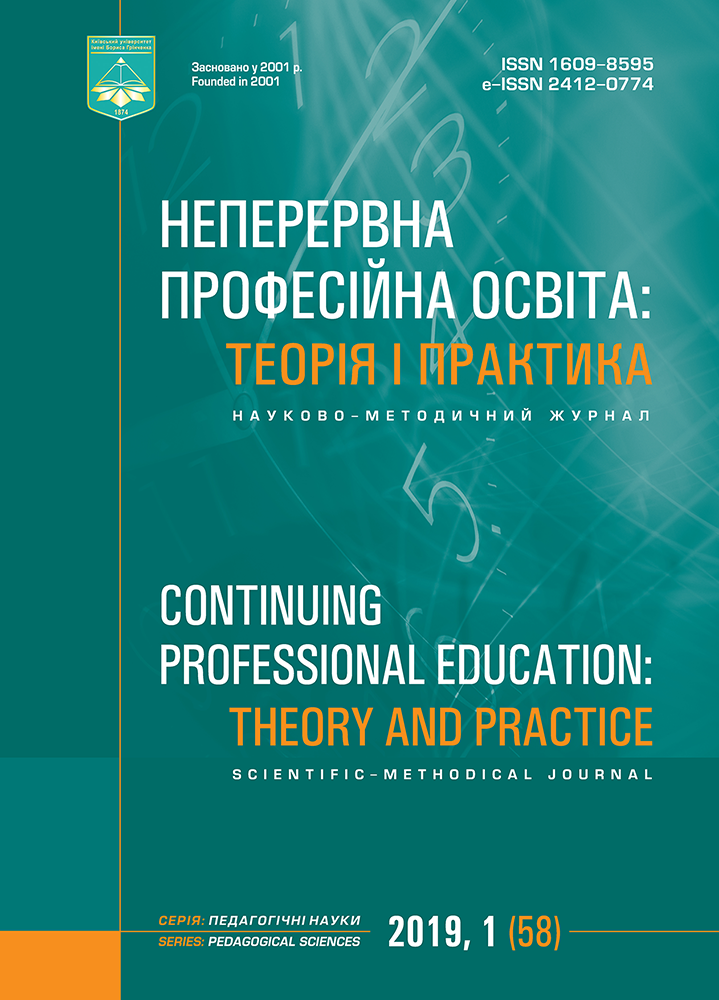IMPLEMENTATION OF PRINCIPLES OF INTERDISCIPLINARY LINKS IN PROFESSIONAL TRAINING IN EU COUNTRIES
DOI:
https://doi.org/10.28925/1609-8595.2019.1.6872Keywords:
інтеграційні заняття, міждисциплінарна інтеграція, міждисциплінарні зв’язки, пізнавальна діяльність студентів.Abstract
The article deals with the conceptual foundations and the search for effective ways of developing the system of higher education in Ukraine. It has been determined that the general tendency of professional training of specialists in the countries of the European Union is the applied interdisciplinary approach. An interdisciplinary approach is analyzed in the process of studying humanitarian disciplines. The quality of professional training depends on the relationship between teaching disciplines, as well as the ability of the teacher to call and support the subjects of learning interest in such relationships. The concept of «integration» is specified, the meaning of «interdisciplinary connections» is substantiated. The strategic directions of updating the learning process based on the application of the principles of interdisciplinary connections in the process of studying a foreign language are determinedReferences
Barry, A., Born, G., Weszkalnys, G. (2008). Logics of interdisciplinarity. Economy and Society, 37 (1), 20–49. DOI: 10.1080/03085140701760841 (eng).
Drake, S. M. & Burns, R. C. (2004). Meeting Standards Through Integrated Curriculum. Virginia, USA: Association for Supervision and Curriculum Development (eng).
Lyall, С., Tait, J., Meagher, L., Bruce, A., Marsden, W. A Short Guide to Evaluating Interdisciplinary Research. Retrieved from http://universidad.edu.uy/resources/1/9/0/1/0_0d69f2c521bb166/19010_c3bef21aec0471d.pdf (eng).
Babenko, A. (2016). Intehratsiia navchalnykh predmetiv: pliusy ta minusy [Integration of educational subjects: the pros and cons.]. Retrieved from http://osvita.ua/school/reform/53351/ (ukr).
Volobuieva, O. F. (2015). Mizhdystsyplinarni (mizhpredmetni) zviazky pid chas pidhotovky maibutnoo fakhivtsia: psykholoho-pedahohichnyi aspekt [Interdisciplinary (between subject) connections during preparation of the future specialist: psychological and pedagogical aspect]. Zbirnyk naukovykh prats Natsionalnoi akademii derzhavnoi prykordonnoi sluzhby Ukrainy. Seriia: Psykholohichni nauky, 1, 26–42 (ukr).
Kremen, V. H. (Ed.) (2008). Entsyklopediia osvity [Encyclopedia of Education]. Kyiv, Ukraine: Yurinkom Inter (ukr).
Zakon Ukrainy «Pro vyshchu osvitu» [Law of Ukraine On Higher Educanion] (2014). Retrieved from http://zakon0. rada.gov.ua/laws/show/1556-18 (ukr).
Ramkova prohrama z nimetskoi movy profesiinoho spilkuvannia dlia vyshchykh navchalnykh zakladiv Ukrainy [The German-language framework for professional communication for higher education institutions in Ukraine] (2014).
Kyiv, Ukraine: Lenvit (ukr).
Sova, M. O. (2009). Kontseptualna model intehrovanoho navchannia i tekhnolohiia yii vprovadzhennia u navchalnyi protses vyshchoi shkoly [Conceptual model of integrated learning and technology of its introduction into the educational process of higher education]. Bioresursy i pryrodokorystuvannia, 1 (1/2), 169–177 (ukr).
Shevchuk, K. (2007). Intehrovanyi pidkhid do navchannia: retrospektyvnyi analiz [An integrated approach to learning: a retrospective analysis]. Naukovi zapysky Vinnytskoho derzhavnoho pedahohichnoho universytetu imeni Mykhaila Kotsiubynskoho. Seria Pedahohika i psykholohiia, 20, 50–55 (ukr).
Downloads
How to Cite
Issue
Section
License
Copyright (c) 2020 Svitlana Zaskaleta

This work is licensed under a Creative Commons Attribution-NonCommercial 3.0 Unported License.



